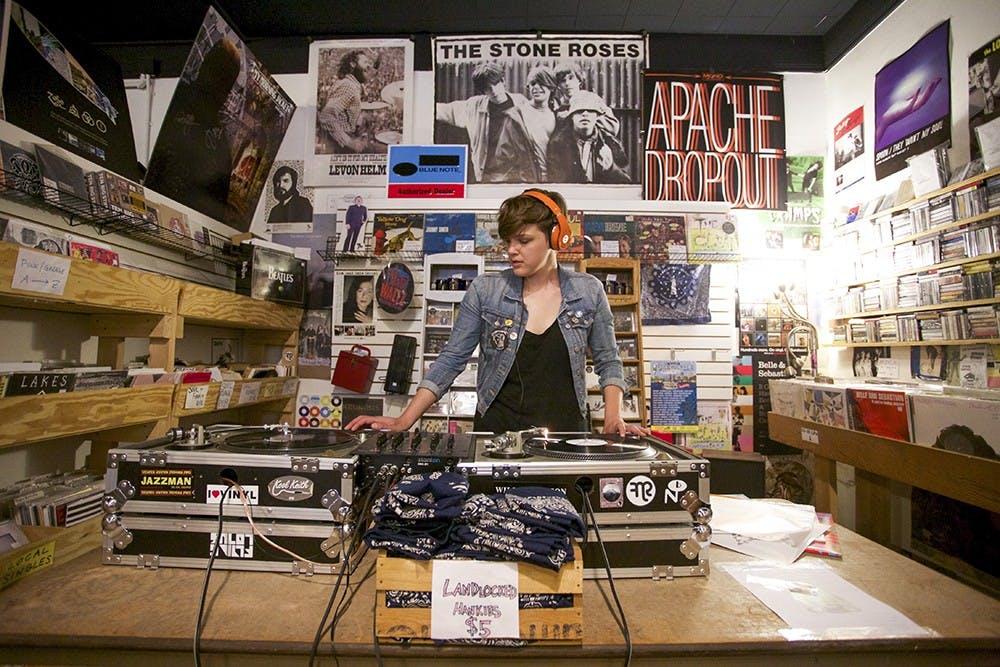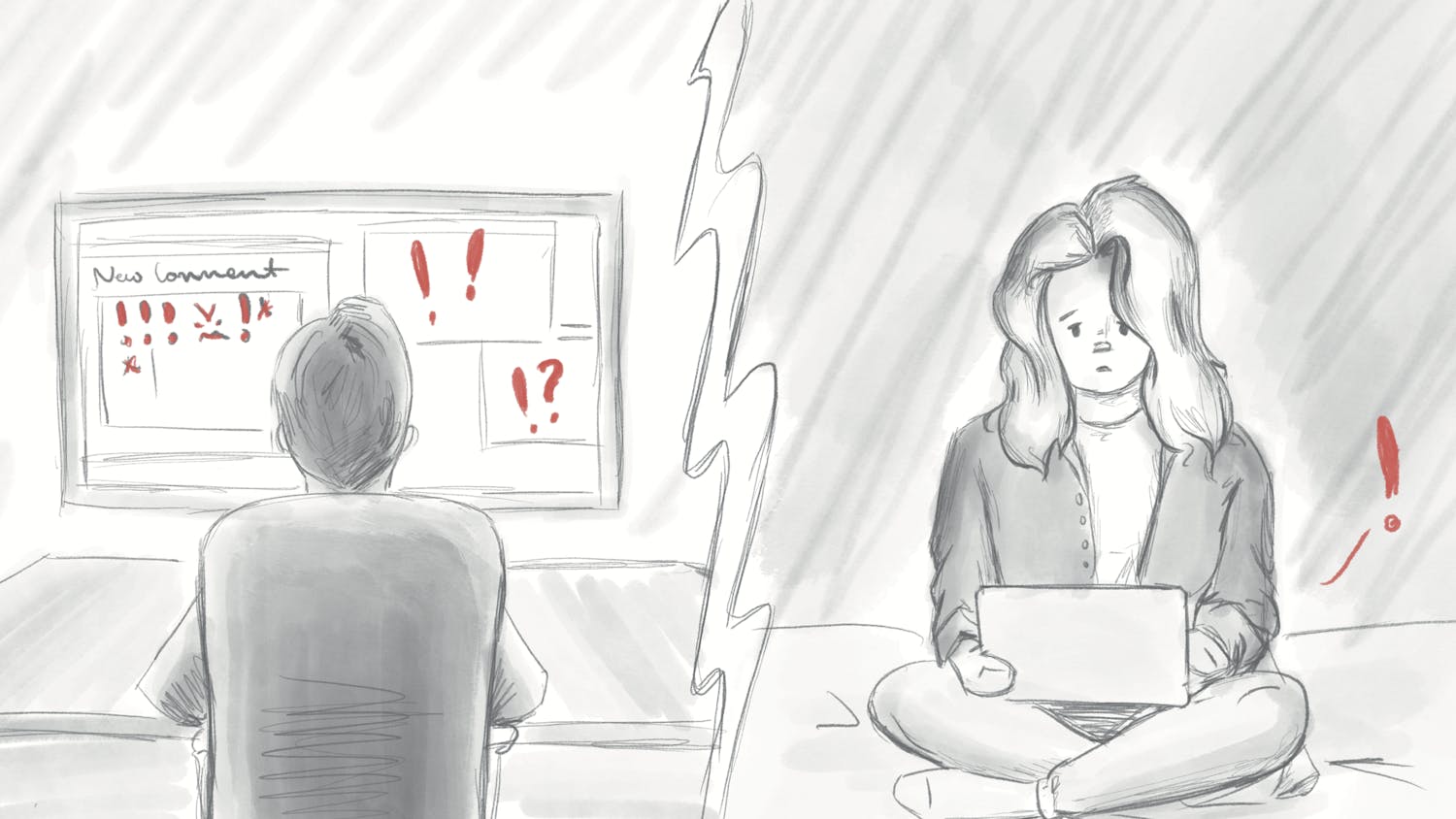The line outside Landlocked Music stretched around the corner of Walnut and Sixth streets and halfway down the block.
Saturday, April 18, marked the eighth annual celebration of Record Store Day, an annual event intended to support independent record stores all across the globe by drawing in crowds with limited-run special ?releases.
In that regard, Record Store Day was a success. The line to Landlocked Music’s door was filled with people willing to wait hours for the store to open just to get their hands on the special release they wanted.
Brandon Funkhouser said he got his spot at the front of the line by getting to the store at midnight. He wanted to get a vinyl reissue of Brand New’s 2003 album, “Déjà Entendu.”
Even showing up at midnight didn’t guarantee he would get the album, he said, because it was a hotly desired release. The reissue sold for little more than $30 in some locations Saturday, but one copy sold for $202.50 after 13 bids on eBay the following day. Other copies were going for similar prices online.
Max Bloodworth, who got to Landlocked Music at 8 a.m., said he likes to listen to his music on vinyl and support local stores, but he also participates in Record Store Day because a lot of the exclusive albums become too ?expensive later in the year.
TD’s CDs & LPs manager Justin Vollmar said he sees some people who only go record shopping on Record Store Day.
“It is a shame that a lot of people come in just that one day of the year for pricing that’s high and selection that’s a lot more competition,” he said. “A lot of the titles even seem sort of strange. A lot of the stuff is released later in ?the year.”
“Déjà Entendu” is one of those albums that will get a second release later in the year. On March 2, the band announced both the Record Store Day release as well as a widespread release for May 5.
The difference is the “limited packaging” of Saturday’s release.
Scott Ferguson, owner of local label Sister Cylinder Records, said he’s also skeptical about how many reissues and remasters get released on Record Store Day, but he doesn’t think the collectibility of the releases is a problem.
“Record collecting is inherently materialistic,” ?he said.
The problem Record Store Day poses for small label owners, Ferguson said, comes with the sheer number of records produced for a single day. This year, the official Record Store Day list tallied more than 350 releases, almost all vinyl.
Last fall, Ferguson began working to release a band’s new record, he said, and the record pressing plant told him the album needed to be ready for pressing by January in order to lock down a June release date.
A few years ago, Ferguson said, the extreme end of the wait time for a pressing was around two or three months; now it has doubled.
“Due to the increased number of releases that get pressed for Record Store Day year after year since it started, the pressing plants that exist in this country, which are not very many with very limited equipment, they get pretty backed up,” Ferguson said.
The large number of releases for Record Store Day can also pose issues for the independent record stores intended to benefit from the event. Vollmar said he started thinking of the day as promotional instead of profitable, and the goal is often just to make back the money they spent buying the stock.
TD’s CDs & LPs doesn’t usually spend much money on promotion, he said, so they don’t spend too much on Record Store Day, but he has seen some stores put a lot of money into the event.
“People spend their year’s rent on Record Store Day,” Vollmar said. “They’re just numbers that seem pretty ?absurd.”
Andy Skinner, a frequent guest lecturer in Monika Herzig’s Music Industry course at IU and co-owner of Indy CD & Vinyl in Indianapolis, said he agrees that the money needed to participate in Record Store Day can be scary for smaller stores, but the sales can easily keep a store afloat until at least Black Friday.
The risk in participating comes from distributors in the mid-1990s instituting a no-return policy on new vinyl in order to phase out the old formats and make more room for CDs, Skinner said. While in the past stores could return unsold product, the no-return policy made unsold, new vinyl a loss for independent record stores that often make a bulk of their sales on vinyl.
In 2014, independent record stores contributed just 12 percent of all album sales, but they contributed 57 percent of all vinyl sales.
“The reason why there needed to be a day to quote-unquote save the local record store in the first place is not because record stores had a bad business model,” he said. “It’s because the business of selling music is actually stacked against record stores.”
Despite the odds, the format’s popularity has increased for nine years straight, according to Nielsen’s SoundScan statistics on the United States music industry. In 2005, vinyl hit its lowest selling point since 1995 at 900,000 albums sold, but more than 10 times that many albums were sold in 2014.
In a digital world, Skinner said there has to be a physical product to sell. He thinks people are choosing vinyl.
“If the digital future of music is streaming, which only means less revenue for the artists, then there’s just going to have to be a physical product to sell,” he said. “I think this is the one; this is the physical piece to sell because of the fact that it’s a forever piece.”
Vinyl still has a long way to go before it becomes the go-to physical product for music. Vinyl album sales made up just 4 percent of all album sales in 2014, compared to 55 percent for CDs and 41 percent for digital.
The biggest contribution of Record Store Day isn’t in the financial benefits, Skinner said. Record Store Day has been the most helpful in providing exposure for independent record stores, he said, and the day makes people realize record stores and vinyl records are still out there for them to support and buy.
“These new fans of the vinyl format are just now finding out that there are record stores,” Skinner said. “You have to find out somewhere, and if it takes a one-day, flash-in-the-pan hype machine to do it, then I’m for it.”
Jared Cheek, owner of local label Flannelgraph Records, said he hopes the recognition for independent record stores carries over to the other members of the local music industry.
“Bloomington has a ton of great local bands and local labels,” Cheek said. “Ideally, a new person walks into a record store on Record Store Day, realizes what they have here in their town and becomes a frequent visitor.”






